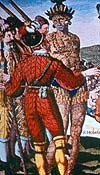
The Timucuans helped their new neighbors adapt to conditions in the “new world”—sharing food and even helping them build a village and fort. The French, well aware of their minority status, initially made every effort to avoid alienating local tribes. Only when starvation threatened did this policy unravel. Mistrust turned to armed conflict, and the brief period of harmony between French and Indian came to an end. Yet the Timucuans apparently remained neutral during the attack by the Spanish against the French fort in 1565 and actively assisted De Gourgues’s forces in the successful French recapture of the fort in 1568. The Florida tribes could not long survive contact with Europeans. After driving out the French, the Spanish imposed tribute on the Timucuans and forced them into missions. Devastated by European disease and attacks by other Indians, the Timucuan culture rapidly disintegrated. From a population possibly numbering tens of thousands at the time of contact, only an estimated 550 Timucuans were still alive in 1698. Today there are no known Native Americans who call themselves Timucuan. Timucuans hold an early place in the European consciousness of Native Americans. French colonist Jacques le Moyne’s sketches of Timucuan ceremonies and customs provided Europeans with some of their first views of Native Americans. Franciscan priest Francisco Pareja’s translation of a set of catechisms and confessionals from Spanish into Timucuan in 1612 was the first translation involving a Native American language. |
Last updated: April 14, 2015
